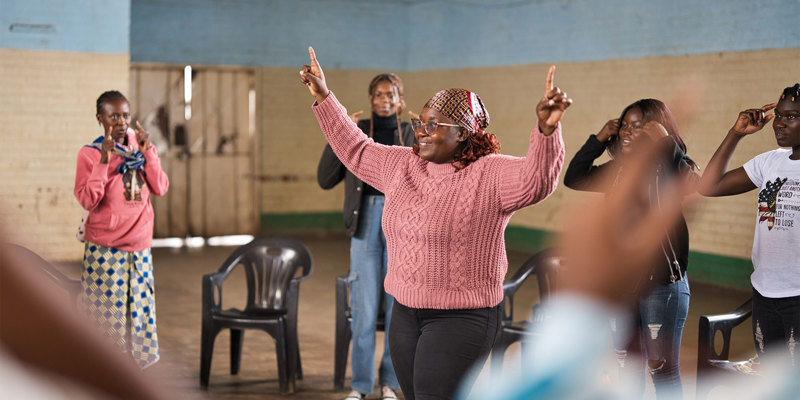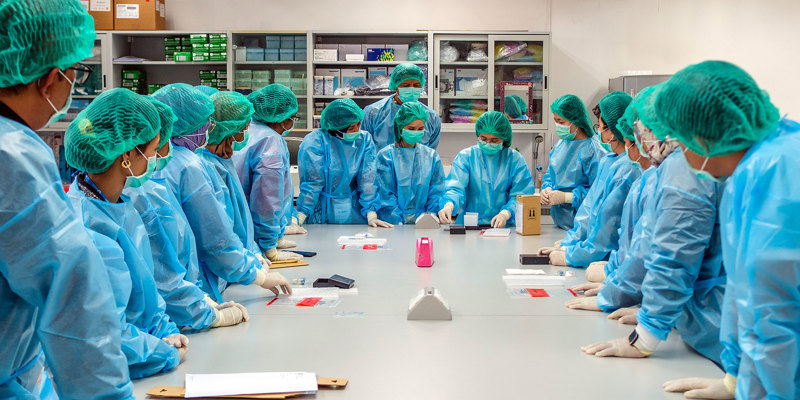Global Fund Donors Pledge Nearly $13 Billion to Help End Epidemics
17 September 2016
MONTREAL - At the launch of the Global Fund's Fifth Replenishment, donors pledged over US$12.9 billion for the next three years, demonstrating extraordinary global commitment toward ending the epidemics of AIDS, tuberculosis and malaria for good.
Hosted by Prime Minister Justin Trudeau, who stressed youth engagement as a key to success in global health, the conference welcomed significantly increased pledges from several donors. Canada increased its own contribution by 23 percent, many new partners pledged for the first time, and private sector contributions more than doubled.
The Replenishment Conference raised nearly $1 billion more than the previous replenishment conference in 2013, and benefitted from participation by leaders from countries all over the world, United Nations Secretary General Ban Ki-moon, and Bill Gates, Co-Chair of the Bill & Melinda Gates Foundation.
The amount raised will save 8 million lives, avert 300 million infections, and help build resilient and sustainable systems for health. The conference is only the beginning of a three-year replenishment period, and the Global Fund will actively work to gain further contributions in the coming months and years, with strong advocacy by civil society and partners worldwide.
Programs supported by the Global Fund have saved 20 million lives since 2002, and averted 146 million new infections since 2012. The Global Fund has also helped stimulate an additional US$6 billion in domestic investments in health by low- and middle-income countries in the most recent three-year period.
"We can end these epidemics for good, if we accelerate our efforts and continue to bring in new partners," said Prime Minister Trudeau.
Prime Minster Trudeau's remarks at the conference embodied a spirit of compassion and commitment to work across borders and find solutions to significant global challenges, like ending AIDS, tuberculosis and malaria as epidemics.
The United States led the pledging with US$4.3 billion, approximately one-third of total funding. The United Kingdom pledged £1.1 billion, the second-largest pledge for this replenishment period; France pledged €1.08 billion, maintaining their position as the second-largest donor to the Global Fund overall.
Germany pledged €800 million, a 33 percent increase; Japan pledged US$800 million, effectively a 46 percent increase when measured in Japanese yen; Canada pledged $804 million CAD, a 23 percent increase; and the European Commission pledged €475 million, nearly a 30 percent increase. The Bill & Melinda Gates Foundation pledged US$600 million.
Sweden Prime Minister Stefan Löfven addressed the closing session of the conference, and pledged SEK 2.5 billion. Norway pledged NOK2.0 billion, a 18 percent increase. Australia pledged $A220 million, a 10 percent increase. All pledges cover the coming three-year period.
Several low- and middle-income countries that are significantly increasing their investments in health also pledged contributions to the Global Fund, to benefit the broader work to end the epidemics globally, including Kenya's pledge of US$5 million.
Pledges from private donors and innovative financing initiatives reached US$250 million for the coming three years, more than double from the previous period.
The Global Fund is committed to achieving maximum impact with available funds, and is constantly evolving to find innovative ways to achieve even better results with available resources. Programs supported by the Global Fund partnership have put 9.2 million people on antiretroviral treatment for HIV, provided 15.1 million people with TB treatment and distributed 659 million mosquito nets to protect families from malaria.
"The Global Fund is one of the most impactful investments a donor can make in global health," said Bill Gates, Co-Chair of the Bill & Melinda Gates Foundation. "The increased generosity pledged by long-standing and new donors is inspiring and will help ensure this unique partnership can continue its critical work to make the world better, safe and more equitable for all."
The Global Fund partnership is committed to removing human rights barriers to health so that everyone can access the health services they need, particularly communities and key populations who are denied access due to stigma or discrimination. The Global Fund invests in many programs that specifically focus on the needs of women and girls, who are particularly at risk from HIV, TB and malaria, and works to address the gender inequalities that are major drivers of the spread of the three diseases. Ending the epidemics requires stronger systems for health, and breaking down the barriers that prevent people from accessing lifesaving health care.
"We have the knowledge and tools to end HIV, TB and malaria as epidemics by 2030, but we need to invest smartly and with focus to make it happen," said Mark Dybul, Executive Director of the Global Fund. "When we work together, we can achieve more than anyone dreamed possible."







